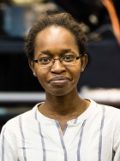Our next SoCS research seminar takes place on Thu 30/1/2020 at 13:00, in room INB2102. This is part of this year’s “Frontiers in Research” seminar series.
 Title: Game theory for self-driving cars
Title: Game theory for self-driving cars
Speaker: Fanta Camara, University of Leeds, and Visiting researcher, University of Lincoln
Date and time: Thursday 30th January 2020, 13:00-14:00
Venue: INB2012, Isaac Newton Building, University of Lincoln, Brayford Pool, Lincoln LN6 7TS
Abstract: Experiments with “self-driving cars” are now appearing on public roads in several countries including the UK, and while their robotic localisation and mapping is regarded as mature technology, control of their interactions with other road users remains a largely open and urgent question.This talk will show how we are using game theory based on the “game of chicken” to model and control interactions between autonomous vehicles and pedestrians. Game theory shows that the vehicle must maintain some “credible threat” of either actually hitting pedestrians or otherwise inflicting some other penalty on them, otherwise they will make little or no progress on the road. Game theory can also show why buying gas-guzzling SUVs is rational if it alters the game solution to encourage other vehicles to yield priority and reduce your own travel time, unless they are suitable taxed to counter this effect.The model is informed by Leeds’ on-road vehicle trials in France and Greece, mathematical modelling, CCTV street data analysis, and psychological lab studies. We are currently extending these experiments with virtual reality and real vehicle trials in Leeds and Lincoln.The model has recently been used and cited in the UK Law Commission’s consultation on autonomous vehicles, and by the Royal Society’s workshop on Digital Technologies and Human Transformation, which may lead to changes in UK policy and law in the area.
Speaker biography: Fanta Camara is a PhD student at the Institute for Transport Studies, University of Leeds, and a visiting researcher at L-CAS, University of Lincoln.